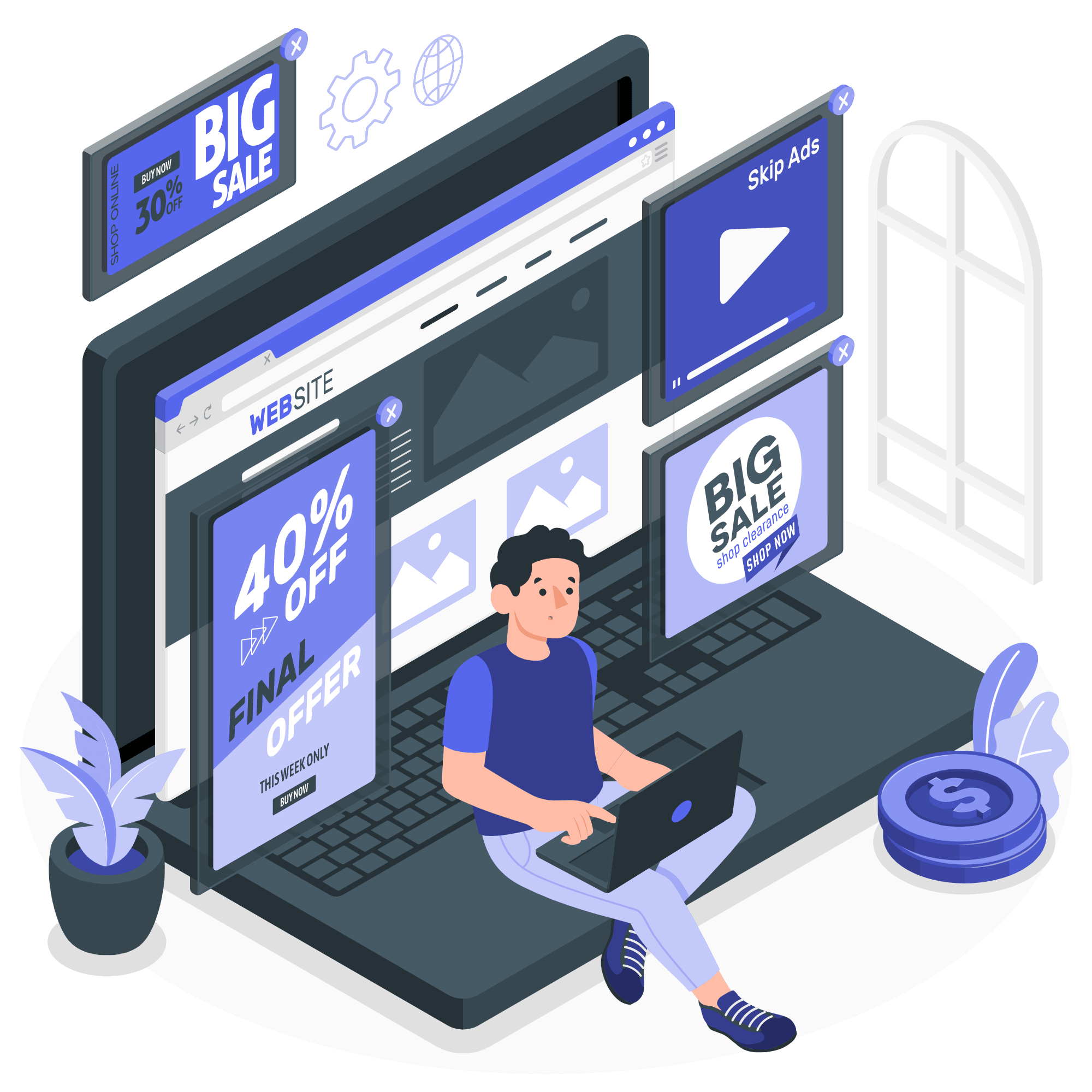Small businesses often suffer from low budgets and limited resources when it comes to marketing. This restricts their brand exposure.
But, with so many marketing channels available today, promoting your business has become easier and cheaper than ever.
About 76% of consumers look at a business' online presence before visiting it in person—that's a whopping number. This figure emphasizes the importance of promoting your business online.
However, promoting a small business online isn’t simple. It requires proper research about the target audience, engaging with them, and creating a buzz that promotes word-of-mouth marketing.
If your business isn’t showing up on search results, you’re missing out on revenue. Thus, following result-driven marketing strategies for small businesses is the key to skyrocketing growth.
With the right marketing strategy, your business will evolve into a popular brand and generate positive ROI.
Importance of marketing strategies for small business

Limited budgets are a constraint in terms of marketing for small businesses as they struggle to gain visibility in a crowded market.
But with access to many advertising options nowadays, there can be no holding back. In fact, stats say 50% of small businesses don’t build a marketing strategy. Thus, you can stand out from the competition with an effective marketing plan.
Small business marketing strategies:
- Boost brand awareness, especially when you’re just starting.
- Target potential clients/customers who are interested in your product (inbound marketing).
- Create a community of loyal fans of your brand.
- Engage with customers online and understand their needs.
- Build a pipeline of qualified leads.
- Help you acquire more buyers in your local area.

Marketing strategies for small businesses to boost growth and sales

There’s no secret sauce for building perfect marketing strategies for your small business. Most marketing techniques require iterations to pay off in the end.
What might not work for others may suit your business well. In short, iterating on the marketing strategies, allocating budget, and tracking marketing ROI help increase brand awareness, reputation, and sales.
1. Capture marketing meeting notes with Fireflies
Organizations spend roughly 15 minutes of their time in meetings. About 71% of those meetings are considered unproductive. It’s estimated that $37 billion is lost to unproductive meetings annually. Holding marketing meetings every week or twice a week won’t do any good if you don’t record what is being discussed in them.
Enter Fireflies, an AI-based notetaker that automatically captures your voice conversations, transcribes them, and summarizes them. That way, none of your employees will have to capture notes manually. Instead, they can take an active part in the discussion, which will boost their productivity. The good thing about Fireflies is that it transcripts meetings in 100+ languages.
Organizations with a remote workforce from across the globe will benefit the most from this feature of this AI notetaker. Other features that make Fireflies a worthy addition to your arsenal of tools are:
- Chrome extension captures online meetings automatically in Google Meet and videos from Loom and Soapbox.
- Create short audio clips of critical parts from recorded meetings, turn them into shareable audio snippets, and collaborate on them with your marketing team.
- The Topic Tracker feature instantly filters the critical parts of calls by adding phrases and keywords across transcriptions.
- Can be integrated with project management software like Trello and Asana and can create tasks using voice commands during meetings.
- AI answer generator AskFred answers all the questions you ask, so you don’t have to sift through lengthy transcripts or recordings.
- The Smart Search feature helps you filter and search for tasks, metrics, topics, dates and times, and action items.
- Conversation Intelligence feature helps extract insights from recorded conversations, quantify them, and understand what works and what doesn’t. It also offers actionable insights from meetings, from speaker sentiments to the topic discussed and the longest monologue.
- Stores all captured voice conversations in one centralized location, which makes it easy for team managers as well as members to access, view, edit, and share them.
- Makes collaboration easy by allowing users to leave comments and reactions at different parts of calls.
- The Fireflies transcript and audio player can be embedded in Medium, Notion, Salesforce, and places where you already work.
Boost Meeting Productivity: Use Fireflies for Easy Note-Taking in Your Marketing Strategy Sessions
Fireflies AI note-taker automatically captures voice conversations and transcripts them within minutes in 60+ languages, making it easy to collaborate.
Try Fireflies for free!2. Content marketing

Content marketing should be at the center of marketing strategies for small businesses. It is one of the most effective inbound marketing tactics that give compounding results.
The primary aim of content marketing is to educate your audience and provide them with value through your content.
As per the Smart Insights report, 18% of marketers said content marketing had the biggest commercial impact on their business. Further, HubSpot reports that 40% of marketers agree content marketing is a core part of their overall marketing strategy.
Content marketing pays off in the long run, but it’s not easy. To stand out, you’ve to create and distribute content consistently and effectively.
You can leverage content marketing for each stage of the customer journey:
- Top of Funnel (ToFu): problems your persona faces and solutions. Use blogs, social media posts, newsletters, videos, etc.
- Middle of Funnel (MoFu): about your solution, your brand, and your product. Use educational resources, whitepapers, webinars, etc.
- Bottom of Funnel (BoFu): Show exactly how your product solves problems. Use case studies, testimonials, customer success stories, etc.
Gain awareness > Develop trust > Offer a solution.
Whatever content you create, ensure it is quality, optimized for readers and SEO, relevant, and distributed smartly.
3. Build a website
Having a website is essential for companies. Often dubbed as the modern-day business card, it adds credibility and helps you create a lasting impression.
A website is a foundation on which all marketing plans are built. It is the source of all your company-related information and allows brands to establish themselves as an authority in their domain through well-thought-out content.
If you’re just starting, getting a website is easy. All you need to do is:
Purchase a domain name and web hosting: Select the domain name and check its availability on the online domain registrar. If the domain name is available, sign up for web hosting.
Choose a content management software (CMS): This is critical for creating content and keeping your website up-to-date over time. Most CMS solutions, including WordPress, already have free templates to help you get started.
4. Search Engine Optimization (SEO)

Having a website isn’t enough. You must fine-tune it to appear among the top results on Google. The number one result on Google SERP gets 31% CTR and has 10x higher CTR than the #10 results (Backlinko, 2019).
What’s more, ranking up one spot in the search results increases CTR by 30.8% (also depends upon your initial rank). That’s why SEO is critical. It’s simply the process of optimizing your website, its content, and its elements for search engines and end-users.
The higher you rank, the more people visit your landing page. In fact, about 35% of all traffic comes from local sources.
Thus, higher ranks will send more traffic to your website, and a majority of them might get converted into customers. Customers searching for a solution will consider your product/ service and likely be delighted.
You can rank higher on SERPs with the following SEO tips for small businesses:
- Create a search engine responsive website and optimize its page load time.
- Use location pages on your website for local targeting.
- List your company on Google My Business to reach the local audience.
- Research key terms your target audience use.
- Create a list of keywords: Primary, LSI, and Long-tail Keywords.
- Analyze Google's first page and understand the Intent behind the searches.
- Optimize your website with targeted and local keywords.
- Create blog posts or videos that relate to your niche and are different from the articles present in the Top 10 SERPs.
- Structure your content for different Google-featured snippets.
- Focus on building relationships with other players and get high-quality backlinks.
5. PPC advertising
Pay-per-click (PPC) advertising helps small businesses display ads in search engines when people search for a specific keyword. It’s a type of paid marketing in which you (the advertiser) have to pay a fee every time your ad is clicked.
PPC advertising might involve a tough bidding war when you’re launching a campaign. But that’s not the case with local keywords, as they are less competitive and underutilized.
PPC is one of the best marketing strategies for small businesses to track money spent and customers acquired. You can use the Google Ads platform to research keywords and use audience targeting to reach people who align with your buyer persona.
When you add an audience to a campaign or ad group, select from a wide range of categories—like fans of travel, people shopping for cars, or target people who have visited your website or app. Google Ads will show ads to people who likely fall into these categories.
6. Email marketing
One advantage that email marketing has over other small business marketing strategies is personalization.
In email marketing, you own the email list of target buyers, unlike other platforms. Plus, you don’t have to send a common message to the masses, which results in a low conversion rate. Instead, you can tailor the message according to the customer and their stage in the buyer’s journey.
A 2021 study reveals that 64.1% of small businesses use email marketing. As a small business owner, you can kick off drip campaigns when a user completes an action like signing up or completing a purchase. You can then send them a series of email newsletters about your products and company updates.
To leverage email marketing strategy for small businesses, learn the following tactics:
- Customer segmentation is based on demographics or activity.
- Deploy a marketing automation software (e.g., Mailchimp) to send targeted emails.
- Or, use a CRM or EPS to automate sending emails to the right customer at the right time.
- Master how to write a sales email that converts.
7. Social media marketing
More than selling, businesses use social media to build strong relationships with customers.
Successful companies aim to build a community of fans and leverage social listening using social media. If you want to engage with your customers regularly, then SMM is a must-have marketing strategy for your small business.
With millions of users spending more than 3 hours a day on social media, it can be intimidating to use every social platform for marketing. But step back because narrowing down is the key here. Go back to the drawing board and figure out who’s your target audience.
Find out, where are they spending the most time? What type of content do they love and talk about? How can you give value to them to make an impact?
Then, double down on the platforms they use the most. For instance, if you’re a B2B company, your prospects most likely use LinkedIn and Twitter. Whereas, if you’re a D2C brand for teens, Facebook or Instagram might be the channels for you.
Depending on your buyer’s persona and their interests, consider the following strategy for social media marketing:
- Twitter: Share product news and quickly answer customer inquiries in real-time. Nike and Starbucks do it best.
- Pinterest: Share inspiring ideas like blogs, infographics, and e-books.
- YouTube: Create user-generated and branded video content.
- Instagram: Share images that showcase your product, services, happy customers' stories, and behind-the-scenes.
8. Facebook Advertising
Facebook is an inexpensive way for small and mid-sized businesses to market products/services to virtually any customer segment. With over six million advertisers, Facebook is one of the largest marketing channels.
Facebook ads trump other channels because they offer advanced targeting options, such as demographics, interests, online behavior, connections, and more, to reach Core, Custom, or Lookalike audiences.
Here are the steps to advertise using Facebook Ads:
- Create a Facebook account for your small business using Business Suite.
- Create an ad creative (photo or video) with a compelling headline, CTA, and engaging visuals.
- Use Facebook Ads Manager, which offers every function you need to start ad campaigns, such as audience targeting, budget, run time, real-time statistics, and much more.
- Evaluate how your ad is performing using A/B tests and double down on the effective one.
If your business relies on a strong visual factor, consider advertising on Instagram instead. As a subsidiary of Facebook, you’ll get all the options to connect with the audience using visual sales.
9. Google my business

If you’re a small business, then Google My Business (GMB) is another effective marketing strategy to attract locals.
Your GMB rankings can significantly boost the visibility and sales of your business. For instance, if a person searches “home renovation company Cincinnati,” this is what they’ll get:
Notice how the three GMBs are at the top of the SERP result. If you can rank in the top three of GMB results, you can attract many highly qualified leads without spending anything. Further, these leads are already in the consideration stage; you just need to pitch your offer when they contact you.
Google My Business combines your data from different public platforms (Google+, Google reviews, Play Store, etc.) and displays it under GMB. Further, if you’ve got a unique brand name, you can get a big display when people search for that name. Thus, if you’re a local business, GMB should be at the top of your marketing strategies.
10. Coupon deal sites
Coupon sites like Groupon are an excellent way to attract new customers to your business. If you’re a business that offers discounts, leverage coupon deal sites to promote your business to interested buyers.
Coupon deal sites attract large chunks of customers based on location and allow regional, local, and national businesses to give limited-time offers to their members.
The prime benefit of this marketing technique is brand awareness and local advertising. Be aware that you’ll incur costs in terms of revenue per sale.
For instance, Groupon requires you to offer at least a 50% discount, and Groupon takes at least 50% of the revenue. It’s basically a form of paid advertising.
Remember, the aim of this marketing strategy isn’t sales—it’s mass exposure and brand awareness. Once you get a flock of new customers, kickstart your customer success and retention strategies.
11. Offer free consultation
If you’re an expert and an authority in your niche, offer free consultations. It’s an effective way of generating new leads and igniting word-of-mouth advertising. Bonus--if you have excellent sales skills, you can close a large number of deals effortlessly.
Don’t worry about giving free information to potential clients. Freeloaders will grab it and run away, and those aren’t your ideal clients.
Your prospects will pay for your premium services because of the value you offer in a 30-minute call. These are the ones that will be loyal and spread the word.
Display free consultation offers using offline media (pamphlets, newspapers, signs) or online (banners on your website, social media, etc.) This strategy isn’t for everyone—it will suit professionals who provide expert service.
12. Use influencers
Influencers are people with a substantial online following. Their opinions can sway their followers' thinking and even set trends.
So, if an influencer promotes your brand, their followers will most likely notice it. Marketing your small business can use some influencers' backing to promote your brand.
You can contact them directly and request that they promote your service or product. You can also give influencers your product for free in exchange for a brand mention or promotion.
Lastly, you can also work with an influencer marketing agency, introducing you to influencers in your industry who are a good fit.
13. Manage online reputation
A few years ago, reputation management was considered necessary for celebrities and large businesses. And it appeared that smaller firms had little to care about. Today, more than 70% of customers start their buying journey with a Google search, making it critical for companies of all sizes to manage their online reputation. Companies cannot afford to come on the SERPs as unreliable and disreputable.
Small businesses, too, need to build a positive brand perception by monitoring reputation, addressing any negative customer feedback, and deploying strategies to prevent and solve defaming problems that could potentially damage brand reputation.
While online reputation management is a topic in itself, there are certain things a brand can do to manage adverse comments online. They should regularly check what Google shows when people search for their company name and put out positive content online while carefully addressing all the negative comments.
14. Ask for reviews
Following up on our previous point, one way to manage online reputation is by asking happy customers to rate and review your product online. In addition to the content you create, product reviews have a significant impact on the minds of potential customers.
In fact, 90% of consumers who read online feedback stated that positive reviews affect their buying decisions. But this isn’t to say that you should manipulate reviews to suit your brand image.
15. Invest in flyers
One of the best business tips for small business owners to boost awareness of their brand is to invest in flyers. These time-tested marketing tools are cost-effective solutions to drive brand awareness and increase sales.
Small and local businesses benefit the most from flyers if they are well-designed and distributed to the target audience. When it comes to flyers, getting creative is the key to success. Design a flyer such that it grabs the attention of your target audience. Use bold colors, easy-to-read fonts, and one-of-a-kind, professional imagery.
Keep the content simple because you don’t have more than a few seconds to hook your audience. Last but not least, include a call-to-action button. It could be anything from “visit our website” to “order now” or “call now.” Or, even better, add QR codes to your flyers on your website or social media accounts so your potential customers can find you online.
16. Run a social media giveaway
One killer marketing strategy for small businesses is to run a social media giveaway. A giveaway contest can help you build a strong following, increase awareness of your products or services, and boost sales. Several studies have observed that the success rate of giveaways is higher than that of other types of content.
Rounding up marketing ideas for small business
Here are the top marketing strategies for small businesses at a glance:
- Capture marketing meeting notes with Fireflies
- Content marketing
- Build a website
- Search Engine Optimization
- PPC advertising
- Email marketing
- Social media marketing
- Facebook advertising
- Google my business
- Coupon deal sites
- Free consultations
- Use influencers
- Manage online reputation
- Ask for reviews
- Invest in flyers
- Run a social media giveaway
Limited resources for a small business shouldn’t hinder marketing. In fact, turn it to your advantage as you’ll have more opportunities to leverage all your resources creatively.
Moreover, small businesses have greater freedom to experiment with uncommon marketing strategies (aka growth hacking). In a nutshell, marketing is as crucial as building a product; if you can build it, you can market it.







